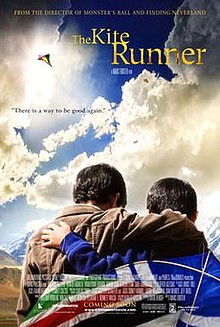
Back عداء الطائرة الورقية (فيلم) Arabic عداء الطائره الورقيه ARZ Çərpələng uçuran (film) Azerbaijani Ловецът на хвърчила Bulgarian The Kite Runner Catalan The Kite Runner Welsh Drageløberen Danish Drachenläufer (Film) German Il cacciatore di aquiloni EML La kajtanto Esperanto
| The Kite Runner | |
|---|---|
 Theatrical release poster | |
| Directed by | Marc Forster |
| Screenplay by | David Benioff |
| Based on | The Kite Runner by Khaled Hosseini |
| Produced by | William Horberg Walter F. Parkes Rebecca Yeldham E. Bennett Walsh |
| Starring | Khalid Abdalla Homayoun Ershadi Shaun Toub Atossa Leoni Saïd Taghmaoui |
| Cinematography | Roberto Schaefer |
| Edited by | Matt Chesse |
| Music by | Alberto Iglesias |
Production companies | |
| Distributed by | DreamWorks Pictures Paramount Classics |
Release date |
|
Running time | 128 minutes |
| Country | United States |
| Languages | Dari English Pashto Urdu |
| Budget | $20 million[1] |
| Box office | $73.2 million[2] |
The Kite Runner is a 2007 American drama film directed by Marc Forster from a screenplay by David Benioff and based on the 2003 novel of the same name by Khaled Hosseini. It tells the story of Amir (Ebrahimi) a well-to-do boy from the Wazir Akbar Khan district of Kabul who is tormented by the guilt of abandoning his friend Hassan (Mahmoodzada). The story is set against a backdrop of tumultuous events, from the fall of the monarchy in Afghanistan through the Soviet military intervention, the mass exodus of Afghan refugees to Pakistan and the United States, and the Taliban regime.
Though most of the film is set in Afghanistan, these parts were mostly shot in Kashgar in Xinjiang, China, due to the dangers of filming in Afghanistan at the time.[3] The majority of the film's dialogue is in Dari Persian, with the remainder spoken in English and a few short scenes in Pashto and Urdu. The child actors are native speakers, but several adult actors had to learn Dari. Filming wrapped up on December 21, 2006, and the film was expected to be released on November 2, 2007. However, after concern for the safety of the young actors in the film due to fears of violent reprisals to the sexual nature of some scenes in which they appear, its release date was pushed back six weeks to December 14, 2007.[4] The controversial scenes also resulted in the film being banned from cinemas and distribution in Afghanistan itself.[5]
Made on a budget of $20 million,[1] the film earned $73.2 million worldwide.[2] The film received moderately positive reviews from critics and was nominated for the Golden Globe Award for Best Foreign Language Film in 2007. The film's score by Alberto Iglesias was nominated for Best Original Score at the Golden Globes and the Academy Awards.
- ^ a b "The Kite Runner (2007) - Financial Information". The Numbers.
- ^ a b "The Kite Runner". Box Office Mojo.
- ^ French, Howard W. (December 31, 2006). "Where to Shoot an Epic About Afghanistan? China, Where Else?". New York Times. Retrieved February 15, 2007.
- ^ "'Kite Runner' release delayed to protect young stars". CNN. AP. October 5, 2007. Archived from the original on November 9, 2007. Retrieved October 5, 2007.
- ^ ""The Kite Runner" Banned in Afghanistan". CBS News. January 16, 2008.